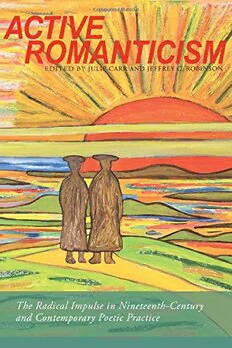
Active romanticism : the radical impulse in nineteenth-century and contemporary poetic practice PDF
Preview Active romanticism : the radical impulse in nineteenth-century and contemporary poetic practice
Active Romanticism Active Romanticism The Radical Impulse in Nineteenth- Century and Contemporary Poetic Practice Edited by Julie Carr and Jeffrey C. Robinson The University of Alab ama Press Tuscaloosa The University of Ala bama Press Tuscaloosa, Ala bama 35487–0380 uapress.ua.edu Copyright © 2015 by the University of Ala bama Press All rights reserved. Inquiries about reproducing material from this work should be addressed to the Uni- versity of Ala bama Press. Typeface: Minion and Goudy Sans Manufactured in the United States of America Cover design: Gary Gore ∞ The paper on which this book is printed meets the minimum requirements of American National Standard for Information Sciences—Permanence of Paper for Printed Library Materials, ANSI Z39.48–1984. Library of Congress Cataloging-in-Publication Data Active romanticism : the radical impulse in nineteenth-century and contemporary poetic practice / edited by Julie Carr and Jeffrey C. Robinson. — First edition. pages cm. — (Modern & contemporary poetics) Includes bibliographical references and index. ISBN 978-0-8173-5784-9 (paperback) — ISBN 978-0-8173-8785-3 (e book) 1. Poetry, Modern —History and criticism. 2. Romanticism —Influence. 3. Poetics. I. Carr, Julie, 1966– editor. II. Robinson, Jeffrey Cane, 1943– editor. PN1161.A28 2015 809.1 —dc 3 2014019863 Contents Introduction: Active Romanticism Julie Carr and Jeἀrey C. Robinson 1 1. Bright Ellipses: The Botanic Garden, Meteoric Flowers, and Leaves of Grass Elizabeth Willis 18 2. “The Oracular Tree Acquiring”: On Romanticism as Radical Praxis Dan Beachy- Quick 31 3. Singing Schools and “Mental Equality”: An Essay in Three Parts Rachel Blau DuPlessis 47 4. A Deeper, Older O: The Oral (Sex) Tradition (in Poetry) Jennifer Moxley 70 5. The Construction of Poems for the Millennium, Volume Three and the Poems It Engendered Jerome Rothenberg 91 6. Copying Whitman Bob Perelman 99 7. “A Spark o’ Nature’s Fire”: Robert Burns and the Vernacular Muse Nigel Leask 108 8. Hyper- Pindaric: The Greater Irregular Lyric from Cowley to Keston Sutherland Simon Jarvis 127 9. Dysachrony: Temporalities and Their Discontents, in New and Old Romanticisms Judith Goldman 145 vi Contents 10. The Influence of Shelley on Twentieth- and Twenty-F irst- Century Avant- Garde Poetry: A Survey Jeἀrey C. Robinson 176 11. The Dialectic of Romantic and Postromantic Ethopoetics (after Certain Hispano- Ameri can Visual Poetries) Heriberto Yépez, translated by Jen Hofer 197 12. The Sublime Is Now Again Julie Carr 212 13. Beyond Romanticism Jacques Darras 228 14. Accident over N: Lines of Flight in the Philosophical Notebooks of Novalis Andrew Joron 234 Bibliography 249 Contributors 265 Index 271 Active Romanticism Introduction Active Romanticism Julie Carr and Jeἀrey C. Robinson Action, the only activity that goes on directly between men without the intermediary of things or matter, corresponds to the human condition of plurality, to the fact that men, not Man, live on the earth and inhabit the world. While all aspects of the human condition are somehow related to politics, this plurality is specifically the condition—not only the conditio sine qua non, but the conditio per quam—of all po liti cal life. In antiquity, speech and action were considered to be coeval and coequal, of the same rank and the same kind; and this origin ally meant not only that most po liti cal action, in so far as it remained outside the sphere of violence, is transacted in words, but more fundamentally that finding the right words at the right moment, quite apart from the information or communication they may convey, is action. Hannah Arendt, The Human Condition The criti cal texts of the English and German Romantics were true revolutionary manifestos, and established a tradition which continues today. . . . But in 1800, as again in 1920, what was new was not so much that poets were speculating in prose about poetry, but that this speculation overflowed the limits of the old poetics, proclaiming that the new poetry was also a way of feeling and living. Octavio Paz The writer sees himself in the Revolution. It attracts him because it is the time during which literature becomes history. It is his truth. Any writer who is not induced by the very fact of writing to think, “I am the revolution, only free dom allows me to write,” is not really writing. Maurice Blanchot (on Sade), “The Gaze of Orpheus” The most sublime act is to set another before you. William Blake In Active Romanticism fourteen poets and critics bear witness to the effects of Romantic poetry and poetics on modern and contemporary innovative poetry. By “active Romanticism” we refer to a poetic response, either direct
